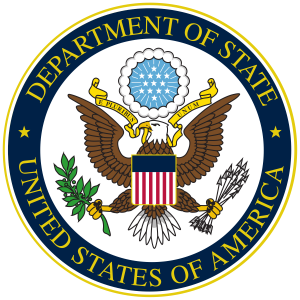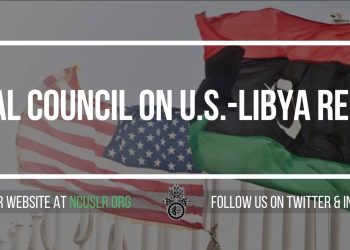By Sami Zaptia.

London, 31 March 2021:
In its executive summary, the U.S Bureau of Democracy, Human Rights and Labor 2020 Libya Report on Human Rights Practices said the outgoing Faiez Serraj Government of National Accord had limited effective reach and control over Libyan territory and over security forces.
It stated that Civilian authorities had only nominal control of police and the security apparatus, and members of security forces committed numerous abuses. And there were significant human rights issues violations in different sectors and across the country.
It reported that impunity from prosecution was a severe and pervasive problem. The government had reduced ability and willingness to prosecute with limited policing and retribution preventing implementation of prosecution.
Commenting on the report, U.S. Ambassador Norland said ‘‘The U.S. stands with the Libyan people and will continue to use the tools and authorities at our disposal to seek accountability for all human rights abusers, and particularly those who commit arbitrary and unlawful killings, forced disappearances, or torture. Now is the time for Libyans to unite in the spirit of justice, stability, and progress.’’
Here is the full executive summary:
‘‘Libya’s Government of National Accord is a transitional government, created through the 2015 Libyan Political Agreement. The 2011 Constitutional Declaration envisions a parliamentary democracy that allows for the exercise of political, civil, and judicial rights. Citizens elected an interim legislature, the House of Representatives, in free and fair elections in 2014. The country is in a state of civil conflict.
The Government of National Accord had limited effective control
The Government of National Accord, headed by Prime Minister Fayez al-Sarraj, governed only a limited portion of the country. Parallel, unrecognized institutions in eastern Libya, especially those aligned with the self-styled “Libyan National Army” led by General Khalifa Haftar, continued to challenge the authority of the Government of National Accord.
During the year the Government of National Accord had limited effective control over security forces, and these forces consisted of a mix of semiregular units, tribal nonstate armed groups, and civilian volunteers. The national police force, which reports to the Ministry of Interior, has official responsibility for internal security.
The armed forces under the Ministry of Defense have the primary mission for external defense and also supported Ministry of Interior forces on internal security matters.
Civilian authorities had nominal control of police and the security apparatus
Civilian authorities had only nominal control of police and the security apparatus, and security-related police work generally fell to disparate informal armed groups, which received salaries from the government and exercised law enforcement functions without formal training or supervision and with varying degrees of accountability. Members of security forces committed numerous abuses.
During conflict both sides benefited from foreign military support
Conflict continued during the year between armed groups aligned with the Government of National Accord and nonstate actors including the Libyan National Army, with both sides benefiting from foreign military support. The Libyan National Army exercised varying levels of control over the majority of Libyan territory during the year.
Turkish military intervention, LNA withdrawal
In June, following months of Turkish military intervention and support to the Government of National Accord as well as intense fighting through the spring, Libyan National Army-aligned forces, including Russian mercenaries belonging to the Wagner Group, pulled back from their prolonged offensive on the Libyan capital and other western cities, retreating to positions in central Libya.
Foreign forces and mercenaries continue to operate in Libya
Foreign military forces, foreign fighters, and mercenaries continued to operate in the country, reinforcing units aligned with both the Government of National Accord and the Libyan National Army. Informal nonstate armed groups filled security vacuums across the country. ISIS-Libya attempted to maintain a limited presence in the southwestern desert region.
October 2020 ceasefire, LPDF and 2021 elections
The United Nations and international partners led efforts to broker a cessation of hostilities, including the signing of a nationwide ceasefire in October, and convinced stakeholders to return to a UN-mediated political process. The UN-facilitated Libyan Political Dialogue Forum convened to make preparations for holding national elections in December 2021, including seeking agreement on a constitutional basis for elections and a reformed executive authority to govern the country in the interim.
Significant human rights infringements
Significant human rights issues included: arbitrary and unlawful killings by various armed groups, including some aligned with the Government of National Accord and the Libyan National Army; forced disappearances; torture perpetrated by armed groups on all sides; harsh and life-threatening conditions in prison and detention facilities, some of which were outside government control; arbitrary arrest and detention; political prisoners or detainees; unlawful interference with privacy, often by nonstate actors; serious abuses in internal conflict, including killing of civilians and the worst forms of child labor, such as the recruitment or use of children in conflict; serious restrictions on free expression and the press, including violence against journalists and criminalization of political expression; substantial interference with freedom of association; refoulement of refugees and asylum seekers; widespread corruption; lack of accountability for violence against women; trafficking in persons; threats of violence against ethnic minorities and foreigners; criminalization of same-sex sexual orientation; significant restrictions on workers’ freedom of association, including limits on collective bargaining and the right to strike; and forced labor.
Impunity from prosecution was severe
Impunity from prosecution was a severe and pervasive problem. Divisions between governmental, political, and security apparatuses in the west and east, a security vacuum in the south, the presence of criminal groups throughout the country, and the government’s weakness and limited reach outside of western Libya severely inhibited the government’s ability to investigate or prosecute abuses across the country.
The government’s reduced ability and willingness to prosecute
The government took limited steps to investigate abuses within its area of reach; however, constraints on the government’s reach and resources, as well as political considerations, reduced its ability and willingness to prosecute and punish those who committed such abuses.
Limited policing and retribution prevented implementation
Although bodies such as the Ministry of Justice and the Office of the Attorney General issued arrest warrants and opened prosecutions for abuses, limited policing capacity and fears of retribution prevented orders from being carried out.
In February the Government of National Accord called for the creation of an international fact-finding mission to investigate abuses perpetrated by all parties to the Libyan conflict.
UN Human Rights Council adopted a resolution
In June the UN Human Rights Council adopted by consensus a resolution to form this mission, and both the Government of National Accord and the Libyan National Army issued statements welcoming the decision.
The Department of State said that it will release an addendum to this report in mid 2021 that expands the subsection on Women (Section 6) to include a broader range of issues related to reproductive rights.







